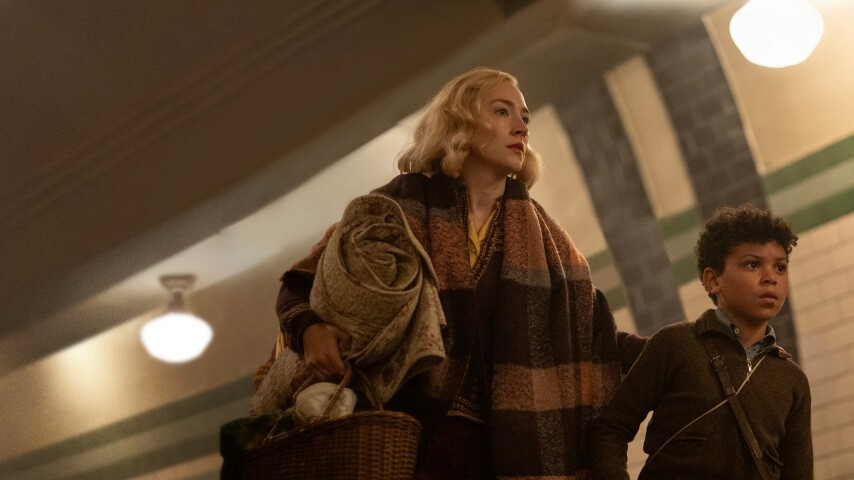The English visual artist turned filmmaker Steve McQueen directed a Best Picture-winning historical epic over a decade ago, and since then, he has—whether consciously or not—avoided taking the awards bait that might be expected to follow a triumph like 12 Years A Slave. He zig-zagged into a pulpy, if unusually thoughtful, heist thriller with Widows; then made a series of five features about the West Indian population of London under the umbrella title Small Axe; and directed some documentaries, including the 266-minute Occupied City, which last year’s New York Film Festival (which also debuted some Small Axe films in 2020) spotlit. By comparison, his new festival entry Blitz feels like the latest salvo in a series of stiff English prestige wars: a chronicle of the German bombing campaign against London during World War II, seen through the eyes of young mother Rita (Saoirse Ronan) and her nine-year-old son George (Elliott Heffernan). It’s precisely the kind of picture that will annoy some with its award-baity qualities while ultimately causing awards-watchers’ saliva to dry up, because its bait isn’t quite juicy enough. (The BAFTAs will likely settle on “good enough.”)
But if awards-consciousness threatens to derail the conversation about Blitz, that’s, if unlikely to be part of McQueen’s precise design, certainly part of what makes the movie a more interesting experience than the polished (and, admittedly, exciting!) likes of, say, Sam Mendes’ 1917, which Blitz superficially resembles at times. George isn’t sent on a mission like the 1917 soldier; he’s sent away from the tumult of bombed-out London, evacuated onto a countryside-bound train full of other kids with a hustle, bustle, and nerves that younger viewers may associate with the Hogwarts Express. (Feel free to cringe, but it’s true.) On the train, George faces a hostility from other kids that he seems to have anticipated—he’s mixed race, and it’s ambiguous whether Marcus (CJ Beckford), the Grenadian father he’s never met, seen only in flashback, has been killed, wrongfully imprisoned (we see cops dragging him away from Rita following an altercation started by a group of racists), or something else. Already seething with anger at his mother for sending him away, George takes control where he can. He leaps off the speeding train and makes his way back to London.
Rita, meanwhile, continues working at a munitions factory, interrupted by occasional evening sojourns to train-tunnel shelters from the falling bombs, and Blitz waits for her to find out that her son has gone missing. This is and isn’t a major star turn for Ronan; Rita doesn’t have a lot of shading, which means the movie depends on Ronan’s accessible glamour to hold attention on its second lead. This works well enough, for what it’s worth, though Ronan doesn’t have much room for the scrappy idiosyncrasies that made her a star in the first place—and in her scenes with Heffernan, she sometimes comes across more like a sweet babysitter than a full-fledged parent. It sometimes feels like a case of a supporting role expanding, however slightly, to accommodate a name actor, because the true lead here is George. He’s the one who must struggle his way through a half-destroyed London that nonetheless finds a way to act like itself, whether giving cover to racists who shoo a Black child away like a pesky rat, or supplying a Dickensian gang of thieves who briefly ensnare him into a particularly ghoulish operation.
That’s the basic episodic structure of Blitz: George gets into various scrapes and dark-hued adventures as he tries to make it home, while Rita worries and eventually searches. Yet McQueen hasn’t exactly constructed an elemental journey of the human spirit. The editing’s rhythm is stranger and sometimes more confounding than that, as the movie weaves in occasional flashbacks that are positioned like showcases and instead hang in the air, unresolved. Sometimes, though, the disorientation works wonders. At one point, McQueen cuts to a lavishly hopping party, and it’s hard to tell precisely where, when, or why this scene is happening. When it becomes clear a few minutes later—following a virtuosic tracking-shot tour of the premises, no less—the effect is brilliantly jarring.
Blitz often feels like a pitched battle between the conventions of big-canvas war recreation and McQueen’s attempt to evoke the stranger, less obviously narrative-driven chaos that happens when the battlefield descends on a major urban center from the sky. He repeatedly cuts to shots of bombs falling through the air, and then cuts away before showing their specific impact; he often positions his camera low, following shoes as they run or stumble through the crowds; and he generally appears on the hungry lookout for new imagery, new ways of processing familiar sights and situations. There are a surprising number of musical moments—Rita and Marcus cutting a rug in a jazz club; Rita called upon to sing to her coworkers, flipped into a gesture of solidarity; a heartbreaking dream sequence—that are at once traditionally glamorous and subversive of war-picture expectations.
Admittedly, it doesn’t all fit together seamlessly, lacking the emotional crescendo of 12 Years A Slave or the hard-hitting conciseness, in exuberance or in social critique, of several Small Axe installments. What really unifies the film’s mix of the familiar and the uncanny is McQueen’s desire to drill into his country’s history, even when the subject appears to be straightforward keeping calm and carrying on. The frame of Blitz might be too tight to accommodate everything McQueen wants to see and do. But it still holds a frequently beautiful, challenging picture.
Director: Steve McQueen
Writer: Steve McQueen
Starring: Elliott Heffernan, Saoirse Ronan, Benjamin Clementine, Paul Weller, Harris Dickinson, Stephen Graham
Release Date: October 10, 2024 (New York Film Festival); November 1 (theaters)


 Keep scrolling for more great stories from A.V. Club.
Keep scrolling for more great stories from A.V. Club.